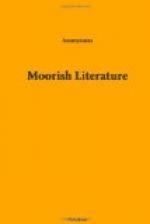The woman: “When
it thunders and the sky is overcast,
Drive home the sheep, O watchful
shepherd.”
The man: “When
it thunders, and the sky is overcast,
We will bring home the sheep.”
The woman: “I wish
I had a bunch of switches to strike you with!
May your father be accursed,
Sheepkeeper!”
The man: “Oh, God,
I thank thee for having created
Old maids to grind meal for the
toilers."[8]
[7] Hanoteau, p. 275 et seq.
[8] Stemme, p. 7, 8.
Another manifestation, and not less important of the popular Berber literature, consists in the stories. Although no attempt has been made in our days to gather them, many indications permit us to believe that they have been at all times well treasured by these people. In the story of Psyche that Apuleius inserted at the end of the second century A.D., in the romance of Metamorphoses,[9] we read that Venus imposed on Psyche, among other trials, that of sorting out and placing in separate jars the grains of wheat, oats, millet and poppy pease, lentils and lima beans which she had mixed together. This task, beyond the power of Psyche, was accomplished by the ants which came to her aid, and thus she conquered the task set by her cruel mother-in-law.
[9] Hanoteau, Essai de Grammaire Khabyle, p. 282 et seq. Alger.
This same trial we find in a Berber story. It is an episode in a Khabyle story of the Mohammed ben Sol’tan, who, to obtain the hand of the daughter of a king, separated wheat, corn, oats, and sorghum, which had been mingled together. This trait is not found in Arab stories which have served as models for the greater part of Khabyle tales. It is scarcely admissible that the Berbers had read the “Golden Ass” of Apuleius, but it is probable that he was born at Madaure, in Algeria, and retained an episode of a popular Berber tale which he had heard in his childhood, and placed in his story.
The tales have also preserved the memory of very ancient customs, and in particular those of adoption. In the tales gathered in Khabyle by General Hanoteau,[10] T. Riviere,[1] and Moulieras,[2] also that in the story of Mizab, the hero took upon himself a supernatural task, and succeeded because he became the adopted son of an ogress, at whose breast he nursed.[3] This custom is an ancient one with the Berbers, for on a bas relief at Thebes it shows us a chief of the Machouacha (the Egyptian name of the Berbers) of the XXII Dynasty nursed and adopted by the goddess Hathor. Arab stories of Egypt have also preserved this trait—for instance, “The Bear of the Kitchen,"[4] and El Schater Mohammed.[5]
[10] Hanoteau, p. 266. Le chasseur.
[1] Contes Populaires de la Khabylie du Jurgura, p. 239. Paris, 1892. Le chausseur.
[2] Legendes et contes merveilleuses de la grande Khabylie, p. 20. 2 vols. Tunis, 1893-1898. Le fils du Sultan et le chien des Chretiens, p. 90. Histoire de Ali et sa mere.




